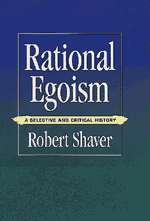Introduction
Published online by Cambridge University Press: 05 November 2011
Summary
Sidgwick writes that there is “preponderant assent” to rational egoism in “the common sense of mankind” and “the history of ethical thought in England.” It is, he thinks, “hardly going too far to say that common sense assumes that ‘interested’ actions, tending to promote the agent's happiness, are prima facie reasonable: and that the onus probandi lies with those who maintain that disinterested conduct, as such, is reasonable.” A century later, many agree that rational egoism is and has been the “default view” that any rival normative theory must defeat.
This book is a selective history of rational egoism. I consider Hobbes and Sidgwick in detail. I concentrate on them because they are, after the ancients, the foremost champions of rational egoism. Hobbes is the textbook example. Arguments in favour of rational egoism culled from him remain very attractive today. Sidgwick is less influential but more squarely focussed on the case for rational egoism. (He is also, to my mind, the most astute moral philosopher.) I argue that neither Hobbes nor Sidgwick provides good arguments for rational egoism and that Sidgwick suggests good arguments against it. My aims are both interpretive and critical.
I shall, throughout, use some technical terms.
Two sorts of descriptive, non-normative egoism should be distinguished. Psychological egoism needs no introduction: It holds that one can pursue only what one takes to be in one's self-interest.
- Type
- Chapter
- Information
- Rational EgoismA Selective and Critical History, pp. 1 - 5Publisher: Cambridge University PressPrint publication year: 1998
- 9
- Cited by



